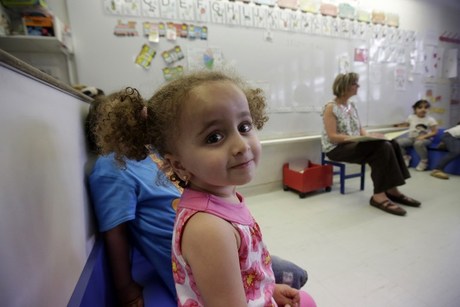French School Survives in War-Rattled Damascus

Angered over Bashar Assad's brutal repression of peaceful protests in Syria two years ago, Paris closed its embassy in Damascus, virtually cutting off the lifeline to the capital's once-thriving French school.
But tenacious parents and staff, driven by their love for French culture and despite financial hardship, have kept the Charles de Gaulle school open, and children continue to study their grammar despite encroaching war.
Charles de Gaulle is still operating thanks to its financial reserves and to the tuition parents are able to pay, although 40 children of dual French-Syrian nationality do receive financial aid.
The school, which follows the French national curriculum, once enrolled 900 students from kindergarten through high school. But its numbers have plunged. Barely 200 students now attend classes, said Zina Farra, who heads the management committee at the school, which has a staff of 80.
"We are responsible for keeping the school alive, because we are deeply attached to French culture and we do not want to break our links with France," she added.
Syria was once part of the Ottoman Empire, which broke up after it came out on the losing side in World War I. In 1920, France took over rule of the country under a League of Nations mandate.
The country gained its independence in 1946, but the love of everything French continued to be a part of many people's everyday life.
The current situation has infuriated some members of staff, such as first grade teacher Marie-Helene Saleh who has worked at the school for 30 years.
"I condemn France's attitude towards this school. From one day to the next, my country cut its financial assistance, and we lost French teachers who were part of our team," said Saleh as she picked out books for her pupils in the school library.
"The school lives on, because we have students who trusted France and its school system. I am here mainly for them and for their parents, who continue to support the school," she added.
Dimitri Argherinos, who teaches literature at the secondary level hails the tenacity of Syrian parents who are helping to keep the school alive.
"What is amazing is the parents' stubborn willingness to keep the school going, despite the difficulties Syria is going through," said Argherinos.
"I am Greek, but I admire French culture and literature," he said, taking a break from teaching the classic works of Stendhal and Maupassant.
The school is located in Mazzeh, an upscale neighborhood in western Damascus that is home to embassies and government buildings and has not been spared deadly violence.
On April 29, a car bomb exploded in Mazzeh targeting the car of Prime Minister Wael al-Halqi, who escaped unscathed but whose bodyguards were killed.
Outside the school heavy machinegun fire crackles in the distance, but it doesn't seem to faze the students in Argherinos' class.
"When we are here (at school) we are in another world," said 15-year-old Doreen Hamoui.
France, in addition to closing its embassy in Damascus," has also shut the French Cultural Center and the French Center for Near Eastern Studies.
But the school council manager Farra is committed to carrying on.
"Registration is open for next year, and even if we only have 10 students, we won't close the school," she said.
In the meantime a former headmaster who retired in Syria was asked to take charge of the school, which follows the French school curriculum.
"I am still here because I am retired, and therefore free to be wherever I want," said Michel Lepretre, who devoted most of his career to teaching in the Arab world.
"I really feel that by (staying in Damascus) I am contributing to better relations between France and Syria."
And hopes for that better future lie, in part, with the little ones who are studying here.
In the kindergarten, children are learning the basics of the French language.
"They don't all express themselves properly in French, but they are making real progress," says Francine Didelot-Kahal, who has been married to a Syrian for 26 years.
"I think they'll start to speak French within months," she said.



